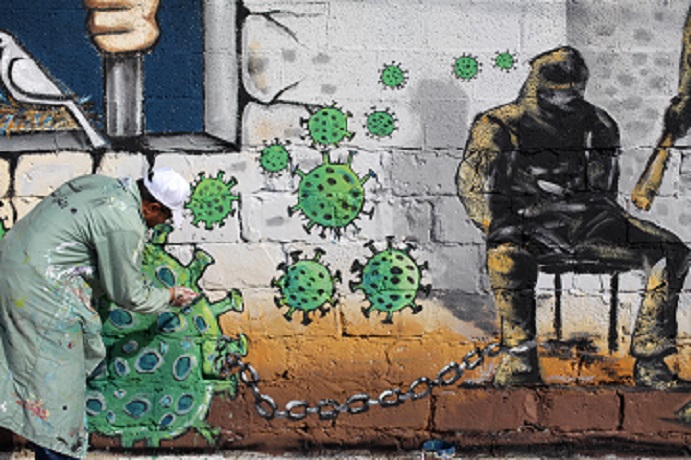
Tamara Nassar
The Electronic Intifada / August 31, 2020
Human rights groups are sounding the alarm over the spread of coronavirus among Palestinians in Israeli jails.
At least five Palestinian prisoners have tested positive for the virus that causes COVID-19 recently, including a child.
They were being held at Ofer military prison near Ramallah, where Israeli occupation forces also detain Palestinian children.
Infected prisoners were transferred from Ofer to Hadarim prison, in central Israel.
Other prisoners who were exposed to the virus were transferred to Hasharon prison, also inside Israel.
The Fourth Geneva Convention forbids Israel, the occupying power, from transferring detainees from the territory it occupies into its own territory.
The Palestinian Human Rights Organizations Council warned of a “real disaster” in the case of an epidemic in Israeli prisons.
Human rights groups have repeatedly warned of Israel’s systematic medical neglect and overcrowding in its prisons in light of the pandemic. They have urged prison authorities to provide sanitary products and release at-risk detainees, including the sick and the elderly.
Israel also subjects detained Palestinians to lack of proper ventilation, poor nutrition, systematic torture and ill-treatment.
This makes “Israeli prisons a dangerous breeding ground for the virus,” Al-Mezan, a Gaza-based human rights organization, said.
Israel has taken no “concerted measure” to ensure that Palestinians it is detaining receive their healthcare and hygiene needs, Al-Mezan added.
But Israel did not cease arresting “hundreds of Palestinians and placing them in interrogation and detention centers” in unhealthy conditions, the Palestinian Human Rights Organizations Council said.
Israel routinely detains children, human rights defenders, students, educators and cultural figures.
Hundreds of Palestinians are held as so-called administrative detainees without charge or trial and without being allowed to see “secret evidence” against them.
All the while, Israel’s highest court ruled in July that Palestinian prisoners have no right to physical distancing to protect against COVID-19.
The Israeli judges decided that detained Palestinians are like family members or flatmates living in the same house. On that basis, prison authorities are not obligated to provide means for physical distancing.
Israel has barred Palestinian prisoners from receiving visits from family or lawyers since March under the guise of coronavirus protection.
Detainees are not brought before military courts either – meaning that “their legal representatives are prohibited from communicating with them, even by telephone,” the human rights coalition said.
Moreover, Israeli prison authorities still refuse to install public telephones in prisons so that detainees can talk to their families.
The Palestinian Human Rights Organizations Council urged the secretary-general of the United Nations, the contracting parties of the Fourth Geneva Convention and the international community to pressure Israel to release at-risk detainees.
Al-Mezan also pointed to Israel’s obligation as the occupying power to providing Palestinian prisoners with adequate healthcare and sanitation.
Tamara Nassar is an assistant editor at The Electronic Intifada












